

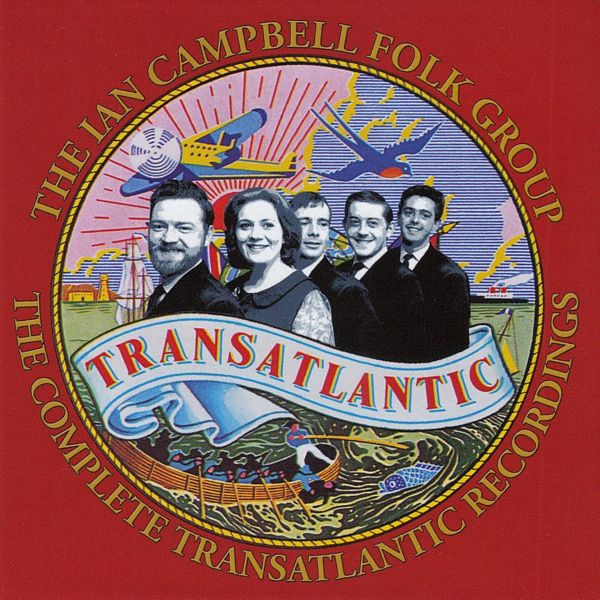 |
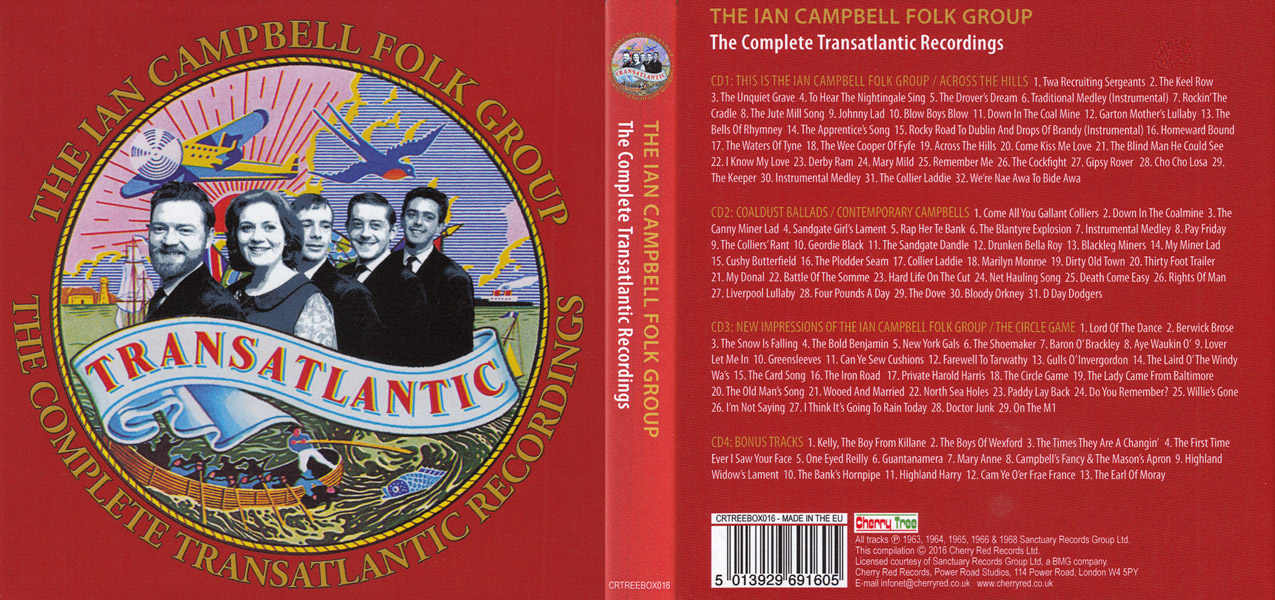
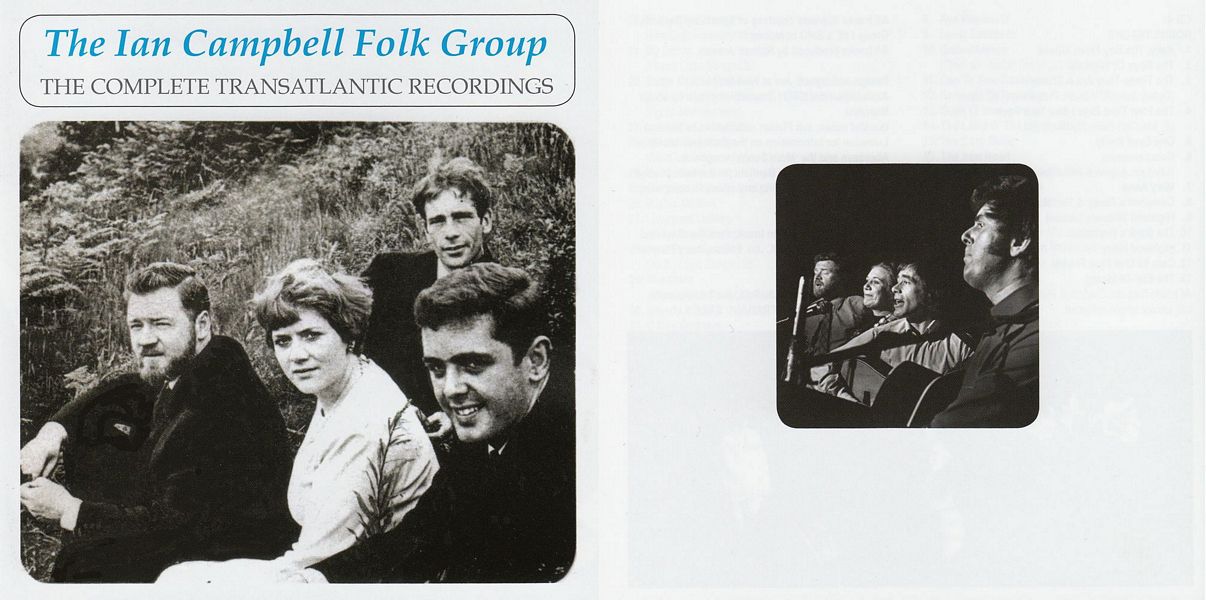
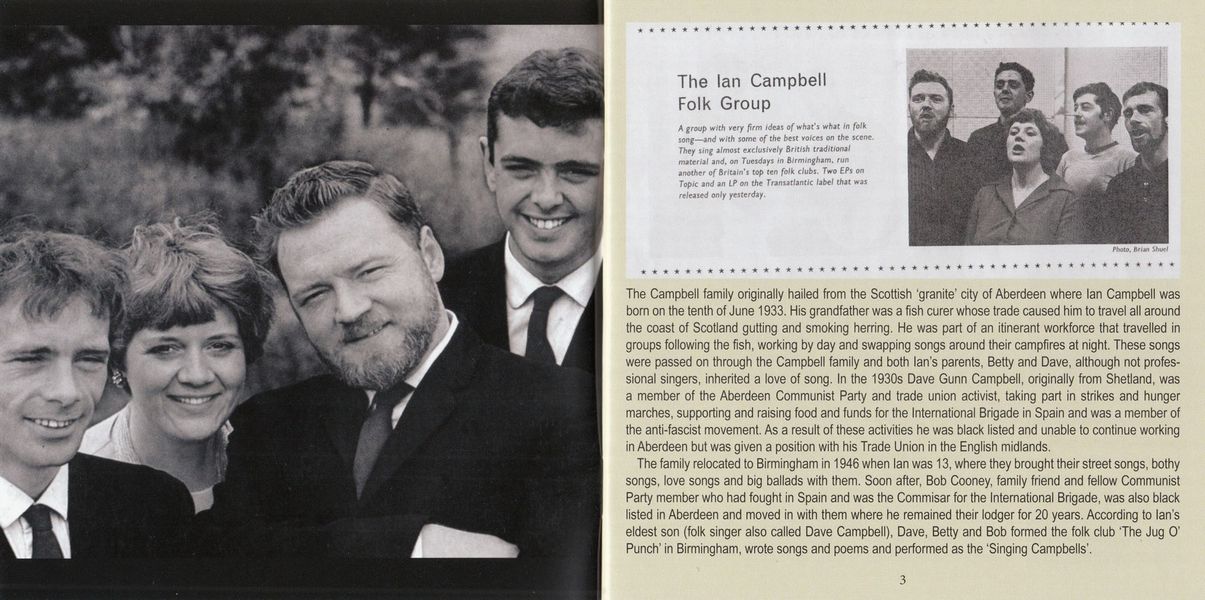 |
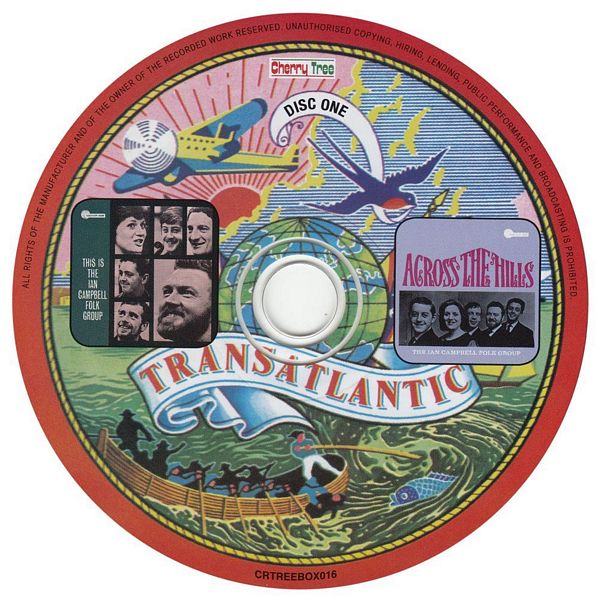
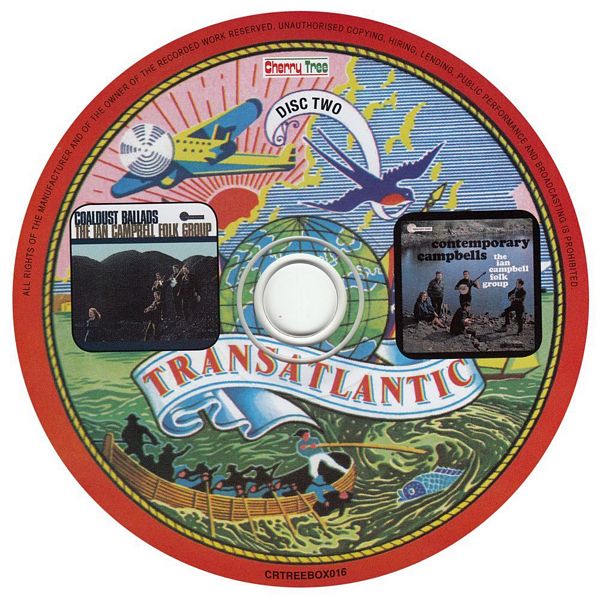
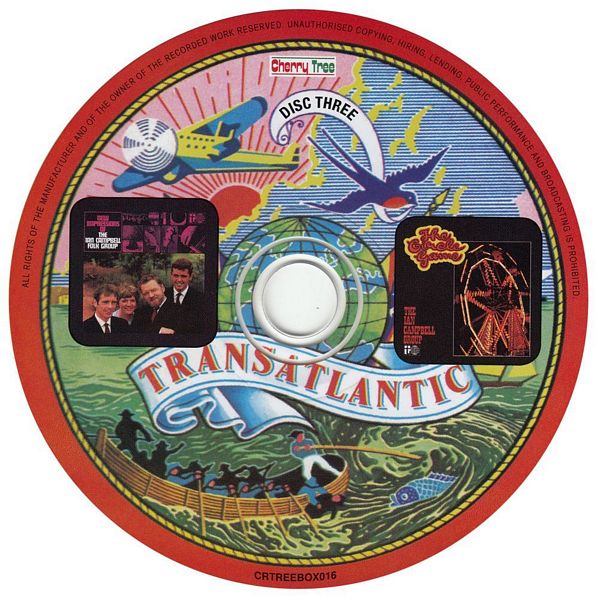
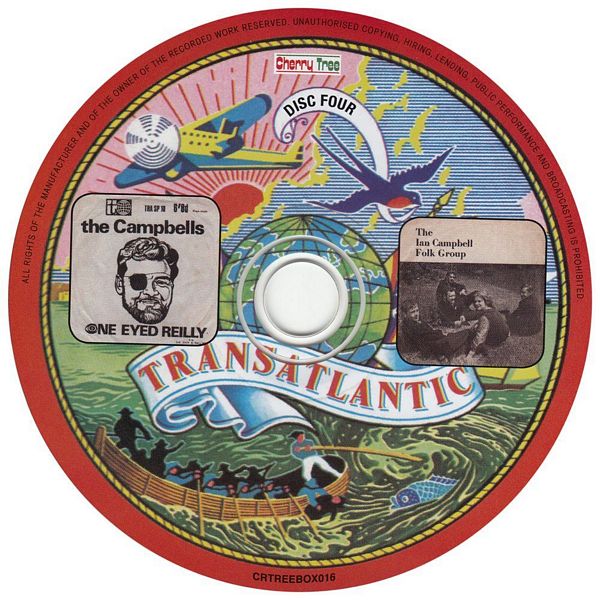
|
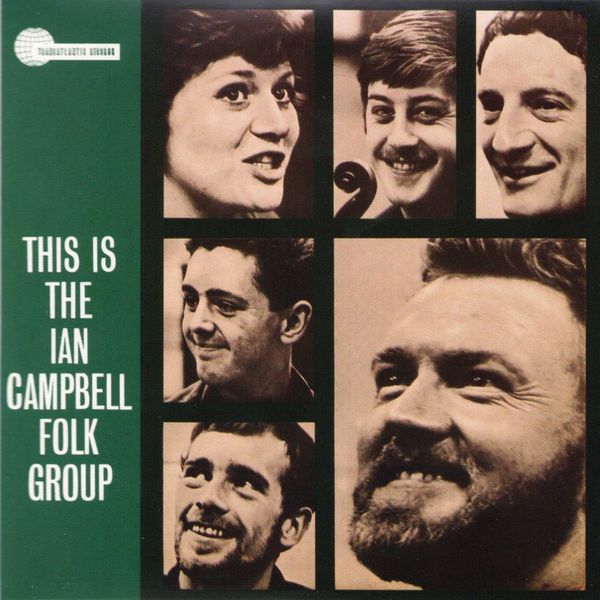
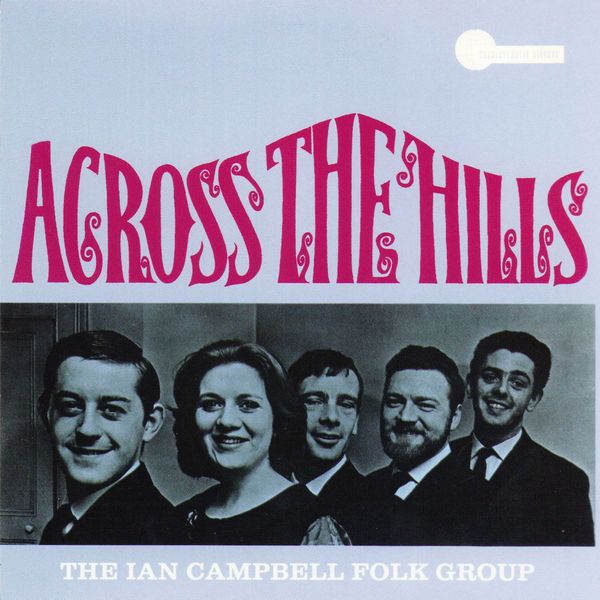
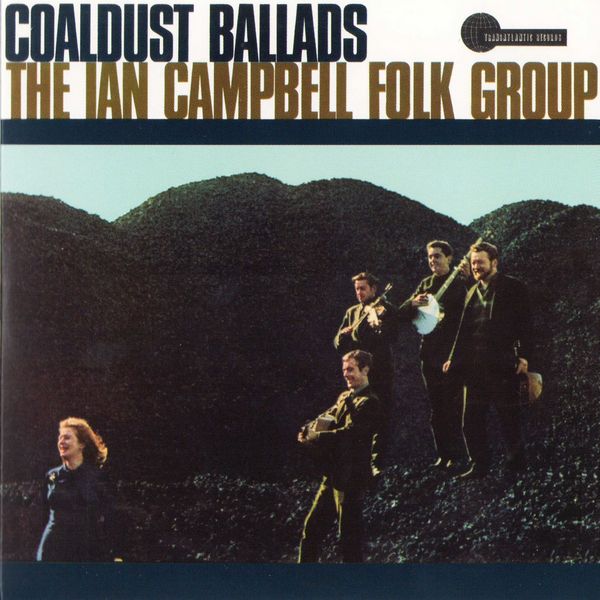
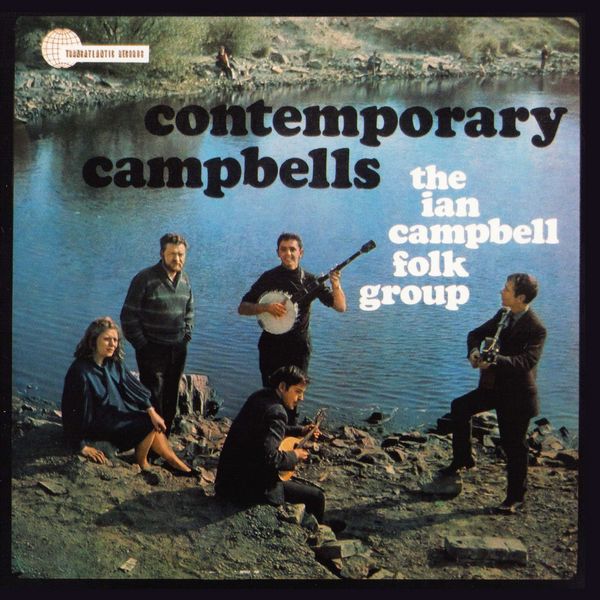
|
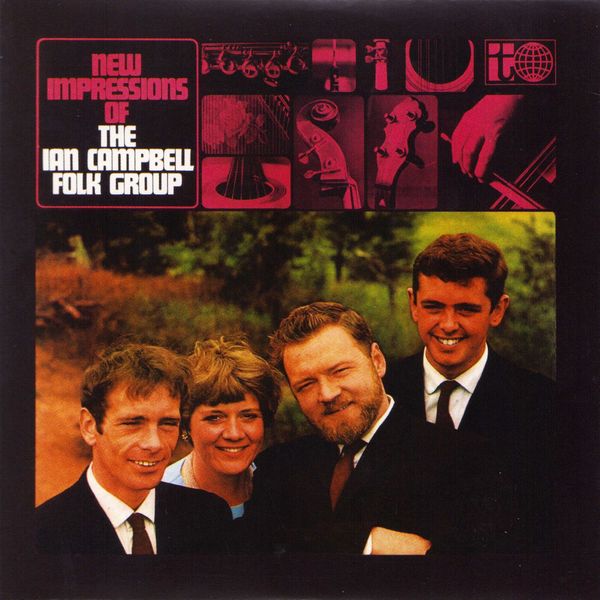
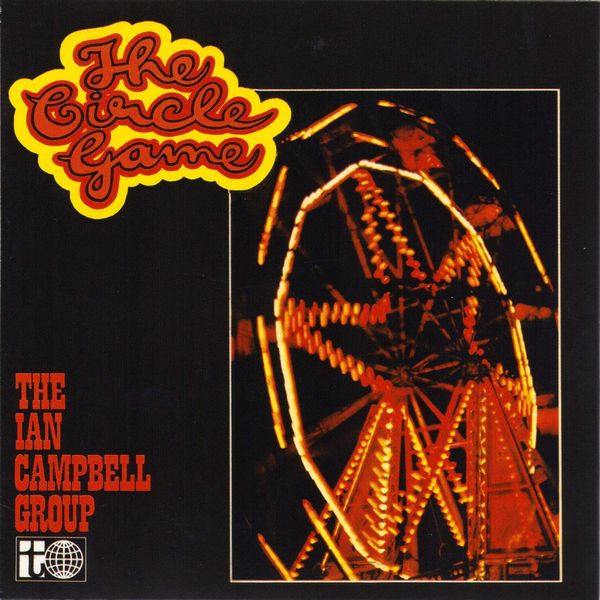
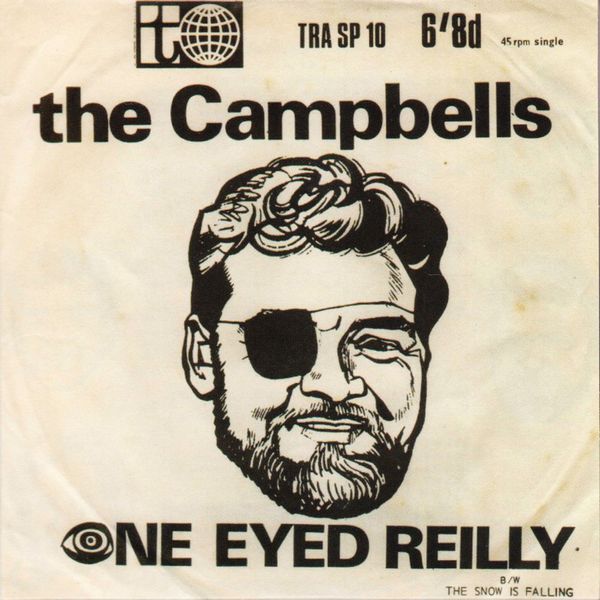
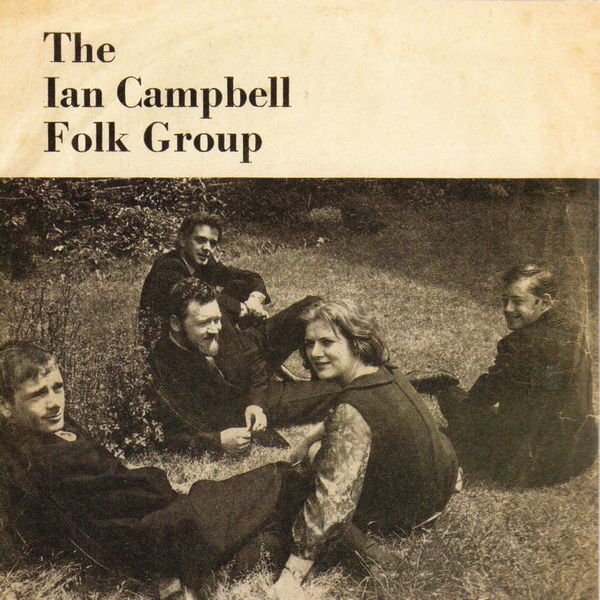
|
| more images |
Sleeve Notes
The Campbell family originally hailed from the Scottish 'granite' city of Aberdeen where Ian Campbell was born on the tenth of June 1933. His grandfather was a fish curer whose trade caused him to travel all around the coast of Scotland gutting and smoking herring. He was part of an itinerant workforce that travelled in groups following the fish, working by day and swapping songs around their campfires at night. These songs were passed on through the Campbell family and both Ian's parents, Betty and Dave, although not professional singers, inherited a love of song. In the 1930s Dave Gunn Campbell, originally from Shetland, was a member of the Aberdeen Communist Party and trade union activist, taking part in strikes and hunger marches, supporting and raising food and funds for the International Brigade in Spain and was a member of the anti-fascist movement. As a result of these activities he was black listed and unable to continue working in Aberdeen but was given a position with his Trade Union in the English midlands.
The family relocated to Birmingham in 1946 when Ian was 13, where they brought their street songs, bothy songs, love songs and big ballads with them. Soon after, Bob Cooney, family friend and fellow Communist Party member who had fought in Spain and was the Commissar for the International Brigade, was also black listed in Aberdeen and moved in with them where he remained their lodger for 20 years. According to Ian's eldest son (folk singer also called Dave Campbell), Dave, Betty and Bob formed the folk club The Jug O' Punch' in Birmingham, wrote songs and poems and performed as the 'Singing Campbells'.
In Birmingham, Ian fell under the influence of the Marxist writer George Thomson, a staunch communist and lecturer at Birmingham University, who believed passionately in education for the working classes and would often give lectures at the local Austin car plant. George's wife ran the Clarion Youth Choir for the local branch of the Workers' Music Association and it was there that Ian took up singing as a teenager.
After leaving school, the young Campbell became an apprentice in the city's jewellery quarter, where he subsequently worked for many years as an engraver. He married Pat in 1952 and they had four boys in the space of six years.
When the skiffle craze broke out across Britain in 1956, Ian and his sister Lorna formed the Clarion Skiffle Group. They were different from most of the other skiffle groups of the day; although they used a similar mix of American folk and blues, they also added the traditional songs they knew from childhood, Fenian and Jacobite songs, and songs of miners, industrial workers and farmworkers. The original line-up was Ian Campbell, then 22, on guitar and vocals, his sister Lorna, 17 on vocals, Dave Phillips on guitar and Gordon McCulloch on banjo.
Reminiscing in 1996, Ian Campbell wrote: "It seems like only yesterday, or a hundred years ago … but it was the fifties. First there was the trad jazz boom, out of which flowered the skiffle craze — small vocal groups singing American folk blues to a chugging rhythm accompaniment on guitars, washboard, tea-chest bass. When the craze died, those thousands of amateur youngsters who sweated on the three-chord trick and created the basic pop line-up went on to discover rock 'n' roll, rhythm 'n' blues, whatever; and some stuck to their roots and started the British folksong revival."
The skiffle craze faded in 1958 but the band carried on, merely changing their name to the Ian Campbell Four, (later The Ian Campbell Folk Group) and immersing themselves in the new folk movement that emerged at the end of the skiffle era. Campbell's socially engaged songs guaranteed bookings, but Clarion already had a Clarion Folk Group. "I wanted to call us the Comkisters," Campbell said, "because that's a name of a type of Aberdeen folk song. Everyone said it was a silly name. Temporarily, because they had asked to book Ian Campbell and his group, we called ourselves the Ian Campbell Folk Group and we never got around to changing it. "
In 1959, Gordon McCulloch left and was replaced by John Dunkerley, then aged 17, who played banjo, guitar and accordion. The following year, the group was enhanced by the addition of 19 year old Dave Swarbrick, originally from New Malden in Surrey but relocated to Birmingham, where, after winning a talent contest with his skiffle band, he was introduced to pianist Beryl and Roger Marriott. The Marriotts took him under their wing and when Beryl discovered that he had played the violin up until the skiffle craze, she actively encouraged him to switch back to the fiddle, and he joined the Beryl Marriott Ceilidh Band. In 1960, after meeting Ian on the 'Radio Ballads' sessions, Dave brought fiddle and mandola to the now established Ian Campbell Folk Group which was to become among the most respected, influential, and prolific ballad groups of the British folk scene.
Ian Campbell was one of the singers chosen by Ewan MacColl, Peggy Seeger and Charles Parker to appear in their pioneering series of documentaries with songs, 'The Radio Ballads', about the lives of working people in particular trades or communities. These were broadcast in the late 1950s and early 60s; Campbell's fine, expressive voice was heard on The Big Hewer', 'Singin' The Fishing' and other of the documentaries.
In the sleeve notes for 'New Impressions', Ian recalls; "The first time I ever sang on radio, was in the Parker and MacColl award-winning programme. 'Singin'the Fishing'. A unique group of leading jazz and folk musicians had been gathered together, and I vividly remember the exhilaration of the rehearsals when I first sang to the accompaniment provided by this great combination. It was perhaps the urge to recreate this exhilaration that encouraged me to form the Ian Campbell Folk Group. 'Net Hauling' was the song I sang on that first occasion".
When Campbell went professional, rather reluctantly — his employers having refused to let him have two weeks off for the group to perform at the Edinburgh festival, where they performed in front of Princess Margaret, who is reputed to have been one of their biggest fans — some on the left, who had regarded him as a genuine proletarian singer, thought he had sold out by going commercial, and spurned him.
TOPIC RECORDS played a major role in this second British folk revival. It began as an offshoot of the Communist led Workers' Music Association in 1939, selling Soviet and left-wing political music by mail order, making it the oldest independent record label in the world. Topic also produced some of the first American blues records to be commercially available in Britain. From about 1950 the two key figures of the second revival, Ewan MacColl and A. L. Lloyd, became heavily involved, producing several records of traditional music. The Campbell Group's first recording was on the Topic label in 1962, the EP, 'Ceilidh At The Crown', recorded live at the crown Hotel in Station Road, Birmingham during one of their 'Jug O' Punch' folk nights.
BILL LEADER, later to become the founder of both Leader and Trailer Records, was working for both Topic and Transatlantic Records as a record producer. For Topic he had recorded some of the Irish folk musicians who were in London in the late 1950s, as well as releasing a Rambling Jack Elliott album. To supplement the meagre income from his recording work, he took a job in Collett's record shop (specialising in folk, blues and jazz records) in Oxford Street, London. Through his work in the shop, he met Nat Joseph who had set up Transatlantic Records and, from 1962, began working with him, part-time, as a producer.
The early days of recording folk artists in England were characterised by low budgets and improvised technology. In the 1960s, Leader lived in Camden and, using a semi-professional Revox tape recorder, recorded a number of artists in his own flat, sound-proofing the room with blankets and egg boxes. John Renbourn described the early recordings of himself and Bert Jansch, in which Leader proceeded by "setting up the tape machine in the sink and having us play in the broom cupboard".
Bill took his trusty Revox to Birmingham and in 1962 recorded the Ian Campbell Folk Group for Topic on what was to be the first ever live folk recording released on vinyl The Ceilidh at the Crown'. The accompanying sleeve notes, by Bill Leader read: AN EVENING AT THE JUG OF PUNCH FOLK CLUB AT THE CROWN STATION STREET BIRMINGHAM
All over Britain folksong clubs are flourishing. Mostly held in pubs, where a filled glass soon abolishes inhibitions about joining in the chorus, these clubs feature resident singers, guests from other parts of the country and members of the club's audience, or 'singers from the floor' as they are often called.
Each of the hundred or so folk dubs in Britain has its own character and atmosphere, sometimes derived from the decor, but usually from the style and quality of the resident performers.
On this record we have tried to capture the atmosphere on a Tuesday night at the Crown in Birmingham. The resident singers are the Ian Campbell Folk Group, whose blending of harmonic arrangements, instrumental accompaniment and the traditional style of singing is unrivalled in Britain at the moment.
Ian Campbell leads the group in most of the items on this record, and sings the eerie Scotts ballad The Two Corbies' (The Two Ravens) unaccompanied. Lorna Campbell's, thrilling voice is heard in the Gaelic song 'The Boatman', and Dave Swarbrick leads the shanty A Hundred Years Ago', whilst his virtuoso fiddle gets underway in the opening two fiddle solos, and can be heard to good effect on 'Broom Besoms' and 'Jolly Beggar'. To complete the group Dave Phillips sings the high parts and plays guitar, John Dunkerley plays banjo and sings bass.
The guests from the floor this evening are Eileen Feely who sings beautifully and quietly in the somewhat declamatory and decorated country style of Irish singers and Mike and John Chapman — veteran folk club organisers — represent the dance instrumentalists, who, on a good night round off a ceilidh at the Crown with an impromptu dancing session.
Later in 1962 the group released a further EP for Topic, the 6 track 'Songs Of Protest' also recorded by Bill Leader with sleeve notes by A. L. Lloyd which included Viva La Quince Brigada', a Spanish civil war song, The Boys Of Wexford', an Irish rebel song, The Peat Bog Soldiers', an anti-Nazi song plus two other protest songs from the Balkans and the peasants' revolt in England. 'We Will Overcome', the anthem of the movement against racism in the southern US states was also included.
Ian felt that folk music needed to challenge the atomic revolution, and decided to try and do something about it. As a result he wrote his first song, The Sun Is Burning' (later covered by Simon & Garfunkel, The Dubliners and Christy Moore), specifically as a campaign weapon for the anti-nuclear movement. Sung at rallies all over the world, it sold 12,000 copies on one Aldermaston march alone, with all proceeds going to the CND. This appeared as the B side of Topic release STOP, 102 with The Crow On The Cradle' on the A side. Later issued with the A & B sides reversed. This song also provided the title for a 1971 LP which included a further strong anti-war song, The Old Man's Tale', which gained great popularity within CND and outside. In his sleeve notes, Campbell wrote: "The demonstrators marched to the strains of [John Brunner's song] The H-Bomb's Thunder', but when circumstances called for something less rousing and more introspective, this … was the song that … often met the need."
Although the group later signed to Transatlantic Records, a further release on Topic, The Singing Campbells' was issued in 1965 (TOPIC 12T120) which featured Two generations of the Campbell family and their lodger recorded during a family get-together. The older Campbells recalled songs from their youth in Scotland; Bob Cooney, the lodger, remembered children's rhymes from childhood; Ian and Lorna and their sister Winnie sang ancient songs freshly learned through the folk revival."
Campbell and his band were one of the many acts to appear on the aspiring Edinburgh Folk Festival albums, a project organised by future Transatlantic men Nat Joseph and Bill Leader. Nat, in particular, was impressed by the group and their socially conscious approach, signing them up as the label's flagship folk act and in 1963 they released their first album, This is the Ian Campbell Folk Group. Lorna's husband, Brian Clark joined the group for this album on guitar and vocals and remained a member until 1978. Later the same year Dave Phillips left the band.
Ian Campbell: "By the time we turned professional in 1963, we had topped the bill at the Royal Albert Hall, were a familiar presence on TV and radio, were working on our second album and running Britain's biggest
folksong club. We were blazing a trail: the skiffle group that uniquely found its repertoire in the British folk tradition became the first folk group of the revival, first to feature a fiddler and present traditional instrumentals among their songs and followed on with the first live club recording and the first folk series on British TV. "
TRANSATLANTIC RECORDS:
Nat Joseph was born in 1939, he studied English at Cambridge University and in 1960 spent a post graduate year in the USA, where he tuned in to the American roots music he heard in folk and blues clubs. He realised that most of the albums he purchased to take home were unavailable in Britain so decided to take on the task himself, founding Transatlantic Records. The company's very first releases were a trio of sex education albums — scandalous in 1961 Britain. The resulting controversy helped generate sales of over 100,000 units — and bank rolled Joseph's desire to invest in adventurous artists and new music. The company had a pivotal role in the massive boom in British folk music (contemporary & traditional) in the 1960s and 1970s. Discovering, recording, marketing and/or distributing major folk artists — including soloists such as: Ralph McTell, Bert Jansch, John Renbourn, Dave Swarbrick, Harvey Andrews, Stefan Grossman, Alex Campbell, Hamish Imlach, Sidney Carter and Gordon Giltrap. Bands and duos such as: The Dubliners, Pentangle, The Boys of the Lough, Decameron, Mr. Fox, The Johnstons, The Watersons, The Sallyangie, The Humblebums, The McCalmans, Young Tradition, Robin & Barry Dransfield, Finbar & Eddie Furey Royston & Heather Wood.
In 1964 the group released a 7" single on Decca, the Sidney Carter, Rory McEwen song 'Marilyn Monroe' backed by The Bells Of Rhymney',' later followed by a 4 track EP, also on Decca which featured 'Paddy On The Railway' as its opening track and concluded with 'Drill Ye Tarriers Drill'. The LP ACROSS THE HILLS was also released in the same year, with a mix of contemporary and traditional songs, adding greatly to their growing reputation. Two Irish songs, 'Kelly, The Boy From Killane' and The Boys Of Wexford' were recorded for Topic and scheduled as STOP 108 but were released instead on Transatlantic as TRA SP2. The group were also making many television appearances throughout the early 60s including the Hootenanny Show, Barn Dance and Hullabaloo. Concerts and packed houses followed at the Royal Albert Hall and the Royal Festival Hall in London. The Ian Campbell Group performed at the Newport Folk Festival in 1964, and in 1965 their version of Dylan's The Times They Are A-Changin" reached the UK Top 50. This proved to be one of many near-misses as Dylan's label rush-released his original version, which became a hit instead. The band also recorded 'Guantanamera', but Transatlantic refused to release it as a single because they did not consider it commercial enough. The song became a worldwide hit soon afterwards for The Sandpipers. Campbell was equally unlucky that, while The Sun Is Burning' was covered by Simon & Garfunkel and included on the original pressing of their 'Wednesday Morning 3am' album, it was omitted from the re-pressed and re-marketed version, which went on to sell more than eight million copies, thus denying him huge royalties.
Their next album for Transatlantic, COAL DUST BALLADS, whilst still mainly traditional with a few contemporary tracks, was a slight deviation for the group as all the songs revolved around the same theme — mining. As the sleeve notes state: The title of this LP is also the title of a collection of mining songs by A. L. Lloyd and we are indebted to him for permission to use this title. We are also indebted to him both for his considerable research into mining songs and for his constant help, encouragement and constructive criticism in the past Much of the material for this LP was drawn from his collection "Come All Ye Bold Miners".
'Come Kiss Me' / 'The First Time Ever I saw Your Face' 7" was also released in 1965 as was their next album, CONTEMPORARY CAMPBELLS which was to see the final appearance of Dave Swarbrick, who left to form a duo with Martin Carthy, and the addition of Mansell Davies on bass. The following year brought yet more material from the band. As well as the aforementioned 'Guantanamera' / 'Mary Anne', 'One Eyed Reilly, (featuring a cartoon portrait of Ian on the front wearing an eye patch), backed with The Snow Is Falling', was released as TRA SP10, attributed to The Campbells'. An EP, 'Four Highland Songs', followed the same year. An album, The Rights Of Man', was released on Elektra in the USA following up the release of their first album on the same label in 1963. Flautist George Watt joined the band in 1966, appearing on two albums before leaving two years later. To celebrate the change of instrumentation … replacing the fiddle with the flute and adding piccolo, clarinet, cello and oboe, a new album was released appropriately titled NEW IMPRESSIONS OF THE IAN CAMPBELL FOLK GROUP.
1967 saw the band issue a further single, 'Private Harold Harris' / 'Lover Let Me In', as The Ian Campbell Group'. It appeared on one of the many in-house labels that Transatlantic specialised in — Big T. The following year, Mansell Davies left the group and was replaced by Dave Pegg and Ian released a 10 track solo album Tam O' Shanter — Poems & Songs From Robert Burns' on Transatlantic's XTRA label. Also in 1968, and also on XTRA, Ian and Lorna recorded an album of Scottish ballads, The Cock Doth Craw', with John Dunkerley on guitar, banjo, accordion and Appalachian dulcimer.
Also in 1967, the group produced their second book of songs and music entitled: 'More Songs From The Ian Campbell Group — Being Street Songs and Straight Songs' in which Ian explained his attitude to the progressive development of the folk song. "We make no apology for any alterations we may have made to the words or melodies of some of the traditional songs. This not an act of vandalism but the legitimate prerogative of any responsible artist working creatively within the folksong revival, and is part of a process to which folksongs have always been subject.
One thing all these songs have in common is some quality which made us find them enjoyable to sing, and once again we hope that you, too, will enjoy singing them".
The band's sixth and final studio album for Transatlantic, THE CIRCLE GAME, followed in 1968 containing a higher ratio of contemporary songs than their previous albums. Tracks by Joni Mitchell, Randy Newman, Tim Hardin and Ewan MacColl sit alongside a trio of traditional songs — and it is these six albums, the singles and EPs, along with the extra tracks culled from the two sampler albums released by Transatlantic Records in 1969, that make up the content of this box set.
Dave Swarbrick and Dave Pegg both went on to greater success in the 1970s with Fairport Convention and a further LP The Ian Campbell Folk Group with Dave Swarbrick' was issued in 1969 on MFP. 'The Sun Is Burning' LP appeared on Argo in 1971, 'Something To Sing About, a TV soundtrack album was issued on Pye in 1972 and a 'Live' album recorded in Denmark, where the group always received a rapturous welcome, was released on Storyville in 1974. In 1976 Ian Campbell took a slight diversion, writing 'Adam's Rib', an early feminist 12-song suite, recorded as a solo album by Lorna. This originally appeared on Cottage Records, later reissued on Storyville. The group disbanded in 1978, but still had bookings to fulfill and Ian and Lorna continued to perform through to 1984, adding various session musicians to the band.
Ian Campbell, writing the sleeve notes for a 1996 reissue of the first two albums, concluded: "Throughout the sixties and seventies the folk scene bloomed and in our travels from venue to venue it was easy to identify the numberless groups that were modeled on us, eagerly awaiting our annual album as a source of material. We were conscious that insofar as we had influenced and shaped the folk revival we had affected the development of popular music in our time.
So it is with pleasure and pride that I welcome this reissue. To those younger people born too late to be there I say: this how it was.
For many years the Campells also ran one of the country's most successful folk clubs, the Jug O' Punch in Digbeth, presenting most of Britain's leading performers in the genre to packed houses, usually in the large rear room of Digbeth's civic hall in Birmingham. Having the country's most popular folk group as the resident band certainly helped. Here there were unrepeatable line-ups of guests, from great traditional singers like Margaret Barry, great and long gone Americans such as Doc Watson and Hedy West, and contemporary American folk artists Paul Simon and Arlo Guthrie. Joni Mitchell appeared there in September 1967 and Luke Kelly of Dubliners fame, was a regular as was Ralph McTell, Tim Rose, the Dransfields and Fairport Convention. All this, plus the early days of Martin Carthy and other great revival artists.
At the end of the 70s Ian decided to call time on the Campbell group and went to Warwick University as a mature student to follow theatre studies. He later worked as an editor and occasional presenter in the early days of TV-am, did some teaching and lecturing, became a community arts worker in Dudley and, following the breakdown of his own marriage, moved to Kilkenny in Ireland. He eventually returned to Birmingham, where he still made occasional appearances on the local folk scene, entertaining all around him with his colourful reminiscences and the sheer force of his personality. One final album was recorded by Ian in 1993, 'And Another Thing' on which he was accompanied by family members, Duncan, Lorna, David and Robin Campbell.
In 2011, Campbell was recognised at the BBC Radio 2 Folk Awards for his outstanding contribution to traditional music. With the award in his hand, he launched unscheduled into a short, unaccompanied, traditional song, 'Rattlin' Roarin' Willie'. He also noted that his group had made 19 LPs, some of which sold 70,000 copies; by contrast, when two of his sons, Ali and Robin, formed UB40 and released their first album in 1980, it instantly sold more copies than Ian Campbell had notched up in his entire career. That, he joked, was when he decided it was time to retire from the music industry.
Whether performing traditional material or his own songs, Campbell's music was always driven by his Socialist principles. He believed folk music could change the world and thought the Establishment believed it too, claiming his phone was tapped by MI5. Three of Campbell's sons, Robin, Duncan and Ali, are or have been in the band UB40; his eldest son, David, who was at one juncture, UB40's manager, also sings traditional songs performing as a solo folk singer.
Ian Campbell died on 24th November 2012 at the age of 79.